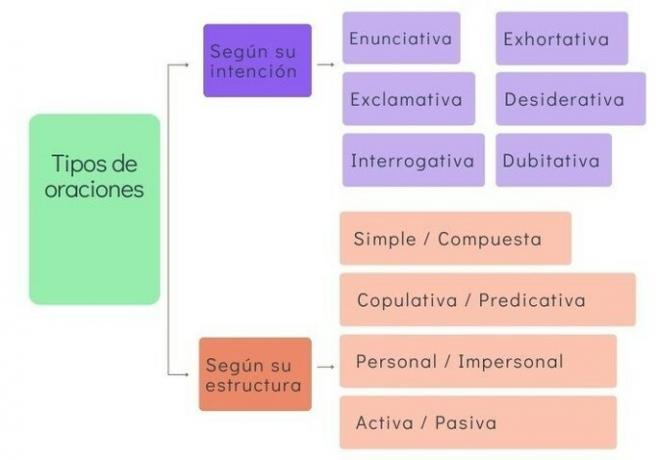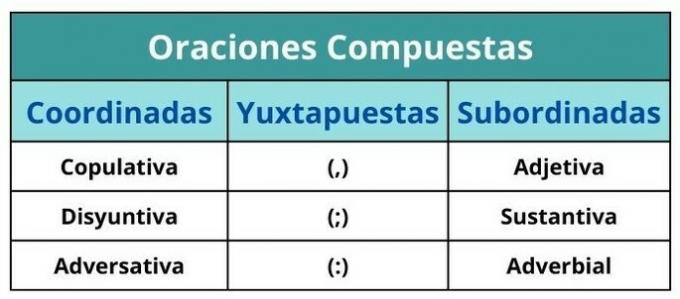Types of sentences and examples
The sentence is a grammatical structure formed by a set of words that express an understandable idea. The types of sentences can vary depending on the number of verbs, the type of verb, but above all, the intention of the speaker.
The types of sentences depending on the intention are:
- declarative sentences
- Interrogative sentences
- Exclamation sentences
- exhortatory sentences
- wishful sentences
- doubtful sentences
If we pay attention to its structure, the sentences can be:
- Simple sentences
- compound sentences
- copulative sentences
- predicative sentences
- personal prayers
- impersonal sentences
- active sentences
- passive sentences
As a syntactic unit, the sentence is composed of two parts, the subject (noun phrase) and the predicate (verb phrase), and each part is made up of a nucleus and its complements or modifiers.
Below we will explain each type of sentence in detail and look at some example sentences.

In the first place we will see the classification according to the intention of the issuer, which gives rise to different
modalities of enunciation: declarative, interrogative, exclamatory, exhortative, doubtful and wishful. These types of sentences can also be affirmative or negative.declarative sentences
A declarative sentence is one that expresses an idea or information, either affirmatively or negatively. For example:
Tomorrow we will eat in a restaurant.
Tomorrow we will not eat in a restaurant.
10 examples of declarative sentences
- The capital of Italy is Rome.
- Animals are not permitted.
- Whales are mammals.
- The flight leaves at seven.
- Adrián will not celebrate his birthday.
- There are free seats at the back.
- Red pepper is sweeter than green.
- My favorite color is black.
- Yesterday we jumped with a parachute.
- These chickens no longer lay eggs.
Interrogative sentences
They are sentences whose objective is to obtain information, to solve a doubt. Interrogative sentences can be direct either hints, compound sentences in which one of its propositions is interrogative. For example:
How is your aunt? (Direct)
I want to know how your aunt is. (Hint)
10 examples of interrogative sentences
- Shall we go to the theater on Sunday?
- I don't know where my mobile charger is.
- When have you arrived?
- He asked me why he didn't call him.
- Do I order to go?
- No cold water left in the fridge?
- What do you want at this hour?
- I wonder what could have gone wrong.
- Dad, are you having dinner here tonight?
- She doesn't know where her ancestors were born.
Exclamation sentences
Exclamatory sentences are used to express emotions and sensations: joy, impression, fear, surprise, etc. They are characterized by using orthographic signs of admiration or exclamatory resources, such as interjections, pronouns, adjectives or adverbs. For example:
How cold is the car!
How does this girl sound to me!
10 examples of exclamatory sentences
- What an illusion to have you here!
- Oh what a great shame!
- How far have you come!
- How you look like your father!
- Pleased to meet you!
- What a race he has hit!
- Welcome to Paradise!
- How fast they grow!
- This wine is delicious!
- What things do you have!
Exhortative or imperative sentences
They are sentences used to request something from another person, to induce him to do or stop doing such a thing. They can be built with verbs in the imperative or subjunctive mode. For example:
Come in in class. (Imperative)
Please, keep silence. (Subjunctive)
10 examples of exhortatory sentences
- Don't say that.
- Do what the teacher says.
- Let's give him a day to spare.
- Give me the table of 9.
- Get down immediately from that tree.
- Better go this way.
- Stay still for a while.
- Set the table for everyone.
- Let's keep calm for now.
- Don't look up.
desiderative or optional sentences
They are sentences that express the wishes of the person speaking. They are generally built with verbs in the subjunctive, which is the way that expresses unreality, desire or lack of certainty in what we say.
10 examples of wishful sentences
- May you have many more.
- Long live the mother of the groom!
- I hope everything goes well.
- Who was this young.
- Good luck on the exam.
- Bless you, boy.
- Have a happy holiday.
- I hope I win the lottery in my town.
- Let it rain all month.
- May the Force be with you.
doubtful sentences
Sentences that express doubt or possibility that the action of the verb will take place are doubtful. They are generally introduced by adverbs of doubt such as perhaps, maybe, maybe, etc.
10 examples of doubtful sentences
- Maybe we will travel to Mexico in November.
- You probably don't remember anymore.
- Maybe I'll cheer up a little party.
- You probably come by bus.
- You might get better with those pills.
- Maybe it snows tonight.
- Maybe my grandparents will come tomorrow.
- We're all likely to get together.
- Maybe this is the last summer.
- He can't come and possibly doesn't want to.
Next we will see the types of sentences depending on their structure, quantity and types of verbs. The two large groups simple sentences and compound sentences, depend on the number of verbs that participate in the sentence.
Simple sentences
Simple sentences have a single verb and with a single subject, which can be simple, compound or tacit, which does not appear in the sentence. For example:
Ana counts sheep every night (she has a single subject, with a single nucleus).
Ana and Laura tell stories every night (she has a compound subject by two cores).
We vacation in August (has subject tacit, that is, the verb indicates that the subject is us, but it does not appear in the sentence).
10 examples of simple sentences
- My grandparents they live in the village.
- Ricardo not has driving license.
- Tomorrow come on hiking in the mountains.
- The movie was pretty bored.
- Wanna a mandarin sorbet
- ¿Dresses Carlos yesterday?
- Cafeteria close on Monday.
- ditch the matter at the meeting.
- No peels the Peach?
- miriam will study in Alcalá finally.
compound sentences
Compound sentences have more than one verb and, therefore, express more than one action. Each of the parts that make up a compound sentence is called a proposition.
The subject can be the same for all actions, as in Cristina plays tennis on Tuesdays and practices fencing on Fridays, where Cristina performs both actions.
But they can also have more than one subject, as in Paco wants his son to study law, where there are two subjects, Paco and his son, and each one performs one of the actions.
There are different types of compound sentences depending on the relationship that exists between their propositions.

If both have the same rank and are joined by a conjunction, it is called coordinated sentence, which in turn can be copulative (and/e), disjunctive (o/u) or adversative (but). For example:
You sing and I dance (coordinate copulative).
Shall we watch a movie either do you want to sleep now? (disjunctive coordinate)
She tries but does not know how to paint (adversative coordinate).
If sentences are joined by punctuation marks such as a comma (,), colon (:), or semicolon (;), they are juxtaposed sentences. For example:
I'm sleepy, I'm going to my bedroom.
Now I follow you; I'm going to refuel
it's an amphibian: breathe in and out of the water.
When one proposition prevails over the other, that is, there is a dependency relationship, it is said to be a subordinate clause. Generally, they are linked by a nexus (that), and can perform various functions depending on the type of subordinate: adjective, noun, adverbial.
The adjective subordinate or relative can be replaced by an adjective and the sentence continues to make sense. For example:
Dog that barks It does not bite.
Dog barker It does not bite.
The subordinate noun can replace a noun, as in:
Wanna you read more.
Wanna a book.
A sentence adverbial subordinate works as an adverb, for example:
the food smells that feeds
the food smells good.
10 examples of compound sentences
- I don't think you'll like the last record.
- It's cold, I'm going to get a coat.
- Bruno will not go to the ceremony, but he will arrive at the party.
- My mother bought the dress I told you about.
- Do I explain myself well or do I repeat it more slowly?
- The car that follows the bus is my brother-in-law's.
- The moral of the fable says that you have to work hard.
- This girl sings that she is glad to hear.
- She takes the photographs and edits the texts.
- It is limited edition: there are only one hundred copies.
Depending on the type of verb, sentences can be copulative either predicative.
copulative or attributive clauses
A sentence is copulative when the verb is copulative, that is, when its verb needs an attribute to acquire meaning. The linking verbs are to be, to be and to seem and if we delete the attribute, the sentence does not make sense. For example:
That house is (makes no sense).
that house is enormous (makes sense).
The predicate of copulative sentences is called nominal predicate, because what is said about the subject depends on the attribute (either noun or adjective) and not on the verb.
We can find compound sentences that are also attributive, in which the subject or attribute is replaced by a sentence.
that you be smart is a point in favor (subject).
The truth is I love that song (attribute).
10 examples of copulative or attributive sentences
- This is my sister.
- Your dress seems very soft.
- The boys are tired.
- Your boyfriend looks like he hasn't broken a plate.
- Everything is ready.
- Rafael is her best friend.
- That train is pretty slow.
- The city looks like a party at Christmas.
- The square is full of birds.
- It's great that everyone is coming.
predicative sentences
Are predicative sentences those built with predicative verbs, that is, they do not require an attribute to make sense.
These sentences, in turn, can be transitive, when the verb is accompanied by a direct object, or intransitive, If the verb does not have a direct object. For example:
Peter buys bread every day (it is transitive, the bread is the CD).
This weekend I work (it is intransitive, the verb to work does not need a CD).
10 examples of predicative sentences
- Yesterday I sent the letter to the insurance.
- Your cousins compete next week.
- At my house we eat paella on Sundays.
- I'll bring the stereo.
- Andrea organizes birthday parties.
- At the end of the scene they kiss.
- The carpenter sands the doors every year.
- This weather is pretty depressing.
- Alejandro will not change the gift.
- They televise the game on the public channel.
If the sentence has a subject, we will be before a personal prayer, but in the absence of a subject the sentence would be impersonal.
personal prayers
They are personal sentences when we know who the subject is. There are sentences in which the subject is tacit or omitted, that is, it is not expressed in the sentence, but the verb tells us who it is. For example:
paula and me We will go to Paris in the summer.
we'll go to Paris in summer (we know that the subject is we or we, 1st person plural).
10 examples of personal sentences
- Your parents celebrate their silver wedding anniversary this year.
- We didn't know half of the story.
- Do you want a cup of coffee?
- The mechanic fixed the car.
- We know that he does nothing wrong.
- Pets are so much fun.
- You will have hundreds of photos of the trip.
- His company is the most ecological.
- I don't trust that candidate.
- Isabel and Fernando were the Catholic Monarchs.
impersonal sentences
An impersonal sentence is one whose verb does not have or does not need a subject. A good example of this are the verbs that refer to atmospheric phenomena, although there are other verbs that do not need a subject either.
10 examples of impersonal sentences
- At six it is daylight.
- In November it rains a lot here.
- They were different times.
- It's a splendid day.
- There are free rooms.
- It snowed every afternoon.
- Good luck, it's hot!
- There is ice on the window.
- It is very good on vacation.
- There was a lot of public.
Depending on the relationship that exists between the subject, the verb and the object, the sentences can be active either passive.
active sentences
The active sentences They are those that have the verb in the active voice and an agent subject, that is, a person, animal or thing that performs the action. For example:
Pedro reads the newspaper.
His dog watches over the farm.
10 examples of active sentences
- Music heals the soul.
- Little Red Riding Hood visited her grandmother.
- The courier delivers the orders.
- Children read how many children.
- The Greeks defeated the Persians in the Medical Wars.
- The wolf attacks the sheep.
- A ship carried sailors to other continents.
- I water the plants daily.
- Carlos walks the dog in the park.
- Picasso painted Guernica.
passive sentences
The passive sentences They have the verbal form in the passive voice and the subject is patient, that is, the person, animal or thing on which the verbal action falls. For example:
The newspaper is read by Pedro.
The farm is guarded by his dog.
10 examples of passive sentences
- The soul is healed by music.
- Granny was visited by Little Red Riding Hood.
- Orders are delivered by courier.
- Children's stories are read by children.
- The Persians were defeated by the Greeks in the Medical Wars.
- The sheep are attacked by the wolf.
- The navigators were taken by a ship to other continents.
- The plants are watered by me daily.
- The dog is walked by Carlos in the park.
- Guernica was painted by Picasso.
See also:
- Simple sentences and compound sentences.
- Subject and predicate.
- types of language.
- Active voice and passive voice.
References:
- Royal Spanish Academy. Association of Academies of the Spanish Language. New grammar of the Spanish language. Madrid: Espasa Books, S.L.U; 2009.
- Gili Gaya, S. (1973). Superior course of Spanish syntax. Bibliography.


